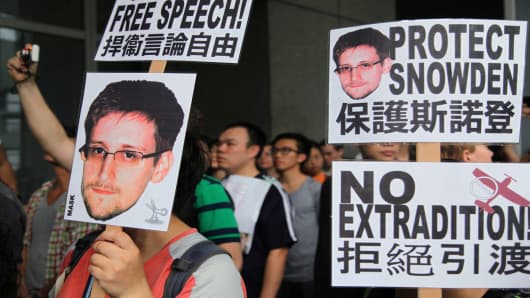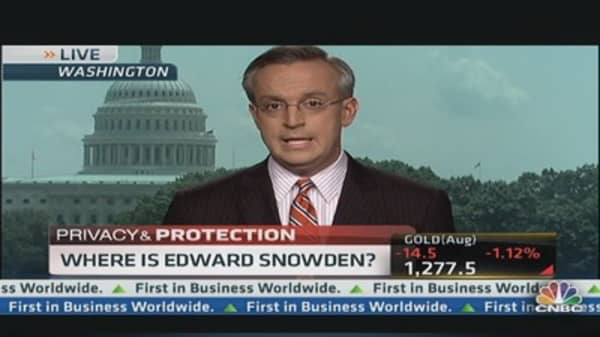The White House issued a blistering criticism of China on Monday over its decision to let Edward Snowden leave Hong Kong, as the whereabouts of the former National Security Agency contractor remained uncertain.
Amid deep frustration in Washington at Mr Snowden's continued success in evading U.S. authorities, the Obama administration also called on Russia to hand over Mr Snowden if he is in the country.
Jay Carney, White House spokesman, said relations between the U.S. and China would "unquestionably" be damaged as a result of Mr Snowden's departure on Sunday from Hong Kong, where he boarded a plane to Moscow.
"We are just not buying that this was a technical decision by a Hong Kong immigration official," said Mr Carney. "This was a deliberate choice by the government to release a fugitive despite a valid arrest warrant, and that decision unquestionably has a negative impact on the U.S.-China relationship."
(Read More: China Said to Have Made Call to Let Leaker Depart)
By leaving Hong Kong for Russia, Mr Snowden has set off a diplomatic game of cat and mouse that has left the Obama administration scrambling to find a way to bring him back to the US, where he faces espionage charges.
The 30-year-old has become America's most wanted fugitive since he leaked documents about U.S. surveillance programmes, including the mass collection of telephone data and claims about the monitoring of online communications. In an interview published in the South China Morning Post on Monday, Mr Snowden admitted that he took a job with intelligence contractor Booz Allen Hamilton to gather evidence about surveillance.
While reports said Mr Snowden was booked on a Monday flight to Cuba, he was not on the plane, according to journalists on board. He has applied to the Ecuador government for asylum, although it is still not clear if that is where he hopes to travel eventually.
(Read More: WikiLeaks' Assange Seeks Asylum at Ecuador Embassy)
Mr Carney said on Monday that the U.S. believed Mr Snowden was still in Russia. Julian Assange, the founder of WikiLeaks, which is providing Mr Snowden with legal assistance, said the NSA whistleblower was "healthy and safe" but provided no other information about his whereabouts. Mr Assange said that Mr Snowden had been provided with refugee documents of passage by the Ecuador government.
Earlier in the day, John Kerry, U.S. secretary of state, warned Russia that it should hand over Mr Snowden to US authorities. "They are on notice with respect to our desires," he said. "It would be deeply disappointing if he was wilfully allowed to board an aeroplane . . . There would be without any doubt . . . consequences."




